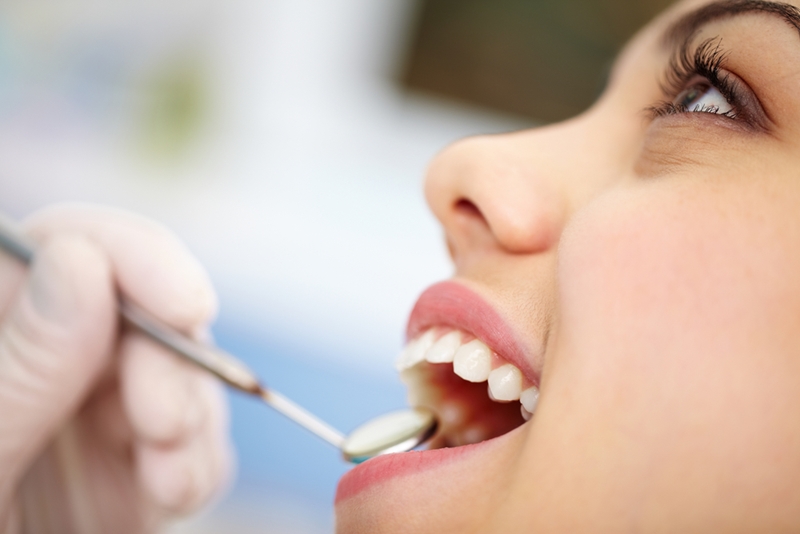
Bad breath, medically known as halitosis or oral malodor, is an unpleasant odor from the mouth, and nearly 50 percent of the population suffers from it.1 Unfortunately, not everyone who has halitosis realizes he or she does. Though it's typically dismissed as merely an embarrassing odor, the presence of halitosis provides insight into other oral health ailments. Therefore, it's important to know the causes and signs of it. Sucking on a mint or chewing gum may temporarily subdue the symptoms, but greater action needs to be taken to combat this issue for the benefit of both your oral health and overall well-being.
The reason behind halitosis
Bad breath is typically caused by an accumulation of bacteria in the mouth as a result of gum disease or plaque. Bacteria can also collect on the tongue, as its surface provides an ideal place for germs to attach and grow.2 The microbes produce volatile sulfur compounds, which, in turn, causes the unpleasant smell.
"This is the same volatile substance released by rotting eggs."
The role of dental hygiene
Proper dental care is essential for removing that bacteria from the mouth. In fact, poor oral hygiene causes 90 percent of halitosis cases.3 Not only does the bacteria itself create foul-odored compounds, it also reacts with the food you consume to make the problem even worse.
What you eat is broken down by bacteria in the mouth, and this process releases an unpleasant-scented gas, often in the form of hydrogen sulfide vapors. This is the same volatile substance typically released by rotting eggs. When food particles are caught between the teeth, bacteria continues working, releasing even more of the hydrogen sulfide vapors.3
Dry mouth is also an oral health problem that can lead to bad breath. Saliva helps balance out the bacteria in the mouth. Without it, dead skin cells may build on the tongue, gums and the inside of the cheeks. Those cells can then rot, emitting a foul odor. Dry mouth can be caused by anything from dehydration to a medication side effect.
You can remove the bacteria from your mouth by brushing twice a day with a fluoridated toothpaste, being sure to brush the whole tongue. You should also floss once per day to remove the bacteria and food wedged between your teeth. A dental health professional can remove more serious plaque and tartar buildup, making regular visits to the dentist crucial for fighting halitosis. Dental discount plans are effective solution to the costs associated with visiting the dentist twice a year.
Food that leads to bad breath
Not properly taking care of your mouth is a major cause for halitosis, but it's not the only way people get bad breath. It can also be caused by eating foods with volatile oils such as garlic, onions, tuna and tacos. These pervasive oils are absorbed in the bloodstream after digestion. That oil-induced blood is eventually carried to your lungs, and the odor comes out when you breathe.4 Brushing or flossing won't combat this form of bad breath, but it's only temporary and can be prevented by eliminating certain foods from your diet. If you think what you eat may be causing oral malodor, it may help to keep a food diary and share your findings with your dentist.
Other habits that cause halitosis
Smoking tobacco can lead to bad breath merely from the smell of the product. It can also result in halitosis from the oral health issues it causes. Tobacco users are at twice as high of a risk for periodontal or gum disease, which is a common cause of bad breath.5,6
Gum disease ranges from slight inflammation, known as gingivitis, to damage to the tissue that surrounds the teeth and shrinkage of gums, known as periodontitis. At this later stage, the gums pull away from the teeth, forming pockets that easily become infected. The infection can lead to an unpleasant odor and taste.7
Diseases associated with bad breath
Systemic disease including diabetes, kidney or liver failure, gastrointestinal problems and lung infections or abscesses may also cause bad breath.2 Some of these health issues lead to oral malodor because they are linked to odor-causing afflictions in the mouth, such as gum disease. However, they also change the chemical composition in the body, which can cause changes in the scent of your breath. For example, people with diabetes have a higher amount of ketones in their blood and urine, which can cause breath to smell like fruit or acetone.8 In fact, health professionals may even use the scent of someone's breath to help make a diagnosis.

Regular dental exams are crucial for fighting halitosis.
Determining whether you have halitosis
If you have any of the above listed oral or health conditions, you may be at a higher risk for halitosis. Additionally, practicing poor oral hygiene habits such as not brushing your teeth twice a day can also make you more susceptible to this condition. It's important to keep open communication with your dentist, especially if you're experiencing bad breath. He or she can help you control the symptoms and determine whether there's a more serious health issue involved.
__________________________________________________________________________
1. "Oral malodor," ADA Council on Scientific Affairs, The Journal of the American Dental Association, February, 2003. http://jada.ada.org/article/S0002-8177(14)61984-X/abstract
2. "Bad Breath: Do You Have It? You May Not Know You Do," Colgate.
http://www.colgateprofessional.com/patient-education/articles/bad-breath-do-you-have-it
3. "What is bad breath? What is halitosis? What causes bad breath?" Christian Nordqvist, Medical News Today, Oct. 7, 2009.
http://www.medicalnewstoday.com/articles/166636.php
4. "Bad breath causes," Colgate. http://www.colgate.com/app/SIS/BadBreath/US/EN/Causes.cwsp
5. "Prevalence of Periodontitis in Adults in the United States: 2009 and 2010," Journal of Dental Research, July 17, 2012. http://jdr.sagepub.com/content/91/10/914
6. "Bad breath causes," Mayo Clinic. http://www.mayoclinic.org/diseases-conditions/bad-breath/basics/causes/con-20014939
7. "Bad breath," British Dental Health Foundation. https://www.dentalhealth.org/tell-me-about/topic/caring-for-teeth/bad-breath
8. "What does bad breath have to do with diabetes?" Susan York Morris, Healthline, Aug. 26, 2014. http://www.healthline.com/health/diabetes/bad-breath
